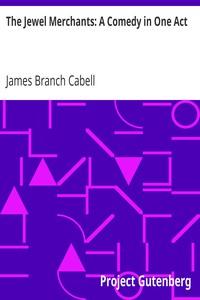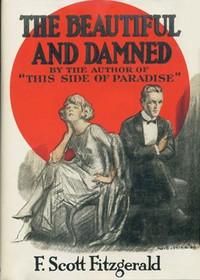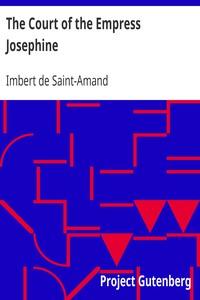Read this ebook for free! No credit card needed, absolutely nothing to pay.
Words: 11245 in 8 pages
This is an ebook sharing website. You can read the uploaded ebooks for free here. No credit cards needed, nothing to pay. If you want to own a digital copy of the ebook, or want to read offline with your favorite ebook-reader, then you can choose to buy and download the ebook.


: The Jewel Merchants: A Comedy in One Act by Cabell James Branch - Drama; Comedies Fantasy; One Act Plays
It read, I still think, well enough: I am certain that, when we came to rehearse, the thing did not "act" at all, and that its dialogue, whatever its other graces, had the defect of being unspeakable. So at each rehearsal we--by which inclusive pronoun I would embrace the actors and the producing staff at large, and with especial ardor Miss Louise Burleigh, who directed all--changed here a little, and there a little more; and shifted this bit, and deleted the other, and "tried out" everybody's suggestions generally, until we got at least the relief of witnessing at each rehearsal a different play. And steadily my manuscript was enriched with interlineations, to and beyond the verge of legibility, as steadily I substituted, for the speeches I had rewritten yesterday, the speeches which the actor delivered naturally.
This process made, at all events, for what we in particular wanted, which was a play that the League could stage for half an evening's entertainment; but it left existent not a shred of the rhetorical fripperies which I had in the beginning concocted, and it made of the actual first public performance a collaboration with almost as many contributing authors as though the production had been a musical comedy.
The play presents three persons, to any one of whom the committing of murder or theft or adultery or any other suchlike interdicted feat, is just the risking of the penalty provided against the breaking of that especial law if you have the vile luck to be caught at it: and this to them is all that "wickedness" can mean. We nowadays are encouraged to think differently: but such dear privileges do not entitle us to ignore the truth that had any of these three advanced a dissenting code of conduct, it would, in the time and locality, have been in radical irreverence of the best-thought-of tenets. There was no generally recognized criminality in crime, but only a perceptible risk. So must this trio thriftily adhere to the accepted customs of their era, and regard an infraction of the Decalogue very much as we today look on a violation of our prohibition enactments.
In fact, we have accorded to the Eighteenth Amendment almost exactly the status then reserved for Omnipotence. You found yourself confronted by occasionally enforced if obviously unreasonable supernal statutory decrees, which every one broke now and then as a matter of convenience: and every now and then, also, somebody was caught and punished, either in this world or in the next, without his ill-fortune's involving any disgrace or particular reprehension. As has been finely said, righteousness and sinfulness were for the while "in strange and dreadful peace with each other. The wicked man did not dislike virtue, nor the good man vice: the villain could admire a saint, and the saint could excuse a villain, in things which we often shrink from repeating, and sometimes recoil from believing."
Such was the sixteenth-century Tuscan view of "wickedness." I have endeavored to reproduce it without comment.
As for our Guido, he is best kept conformable to modern tastes, I suspect, by nobody's prying too closely into the earlier relations between the Duke and his handsome minion. The insistently curious may resort to history to learn at what price the favors of Duke Alessandro were secured and retained: it is no part of the play.
Above all, though, I must remind you that the Duke is unspurred by malevolence. A twinge of jealousy there may be, just at first, to find his pampered Eglamore so far advanced in the good graces of this pretty girl, but that is hardly important. Thereafter the Duke is breaking no law, for the large reason that his preference in any matter is the only law thus far divulged to him. As concerns the man and the girl he discovers on this hill-top, they, in common with all else in Tuscany, are possessions of Duke Alessandro's. They can raise no question as to how he "ought" to deal with them, for to your chattels, whether they be your finger rings or your subjects or your pomatum pots or the fair quires whereon you indite your verses, you cannot rationally he said to "owe" anything.... No, the Duke is but a spirited lad in quest of amusement: and Guido and Graciosa are the playthings with which, on this fine sunlit morning, he attempts to divert himself.
This much being granted--and confessed,--we let the play begin.
THE JEWEL MERCHANTS
Originally produced by the Little Theatre League of Richmond, Virginia, at the Binford High School Auditorium, 22 February, 1921.
GRACIOSA...........................Elinor Fry Daughter of Balthazar Valori
GUIDO........................Roderick Maybee A jewel merchant
Free books android app tbrJar TBR JAR Read Free books online gutenberg
More posts by @FreeBooks

: The Poetical Works of Mark Akenside by Akenside Mark Gilfillan George Editor - English poetry 18th century


: Santo Domingo: A Country with a Future by Schoenrich Otto - Dominican Republic; Dominican Republic History; Dominican Republic Economic conditions






